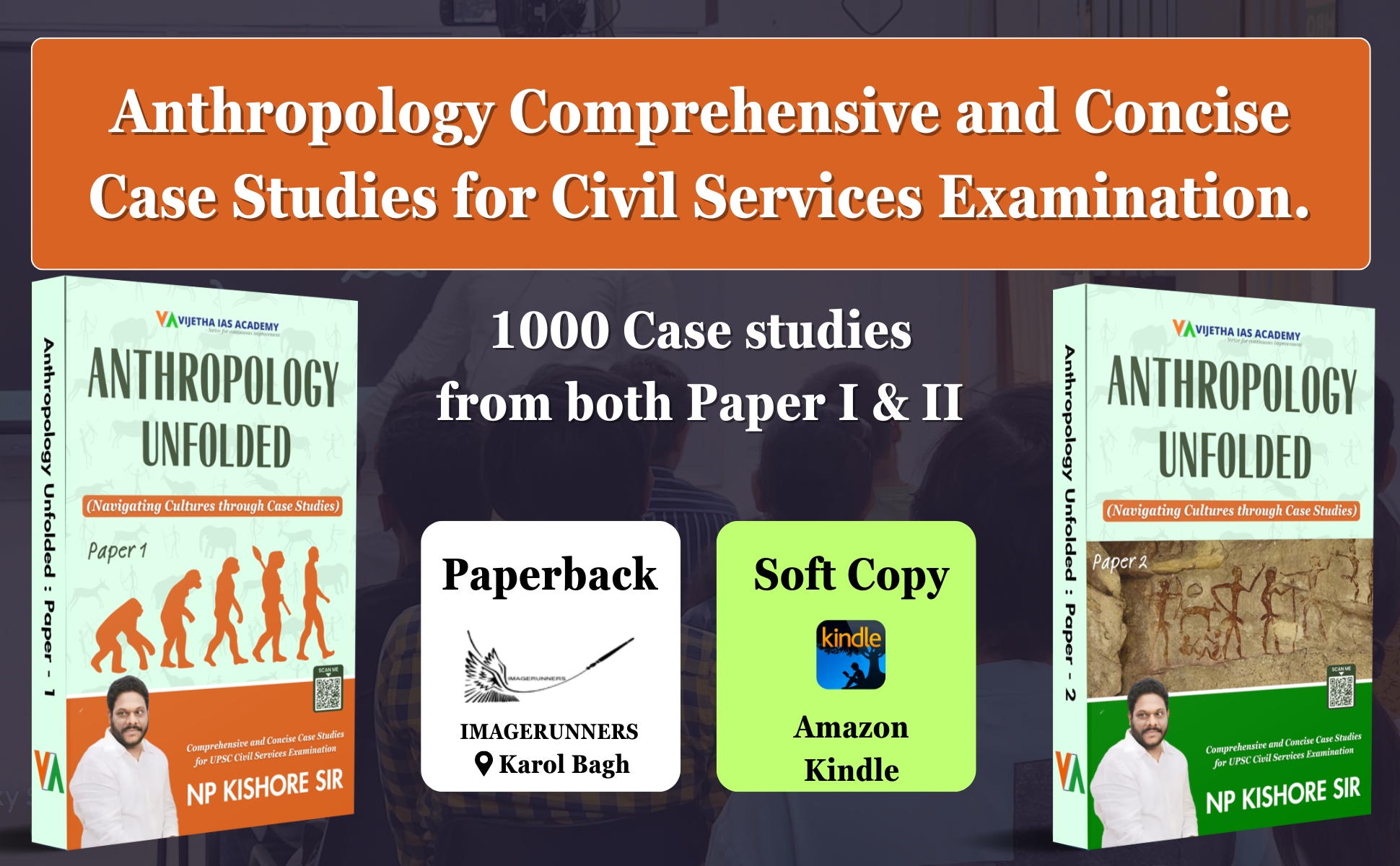
Anthropology Case Studies for UPSC
Selecting the appropriate optional subject might be a difficult part of preparing for the UPSC Civil Services Examination. Because of its relatively short syllabus and scoring potential, anthropology has been a popular choice among the available options. Understanding case studies is essential for both Paper I and Paper II and is one of the main factors in succeeding in Anthropology. Under the knowledgeable direction of NP Kishore, often known as Kishore Sir, we shall explore the value of case studies in Anthropology in this blog, offering examples and insights from Vijetha IAS Academy.
You can get the book here: - Best Anthropology Optional Case Studies Book for UPSC Paper 1
Why Choose Anthropology as an Optional Subject?
Before diving into case studies, it’s essential to understand why Anthropology is a preferred optional subject for many UPSC aspirants. Anthropology offers a holistic understanding of human societies, cultures, and biological aspects, making it an interesting and versatile subject. Moreover, it has a well-defined syllabus, and the concepts are relatively easier to grasp compared to other subjects.
The Role of Case Studies in Anthropology
Case studies are a vital part of the Anthropology syllabus for UPSC. They help illustrate theoretical concepts with practical examples, enhancing the quality of answers in the examination. A well-prepared case study can significantly boost your marks as it showcases your understanding and analytical skills.
Types of Case Studies
- Ethnographic Case Studies involve detailed descriptions of different cultures and societies. They help us understand various cultural practices and social structures and their evolution over time.
- Biological Case Studies: These focus on human evolution, genetic diversity, and physical anthropology. They provide insights into the biological aspects of human beings.
- Archaeological Case Studies: These include the study of ancient civilizations, artifacts, and their relevance to modern society.
Examples of Anthropology Case Studies
To illustrate the importance of case studies, let’s look at some examples that are frequently used in UPSC Anthropology papers.
Ethnographic Case Study: The Nuer Tribe
The Nuer tribe of South Sudan is a classic example of an ethnographic case study. This tribe’s social structure, kinship system, and pastoral lifestyle provide a rich source of information for Anthropology students. By studying the Nuer, aspirants can understand the complexities of social organization and the role of kinship in maintaining social order.
Biological Case Study: The Andamanese Tribes
The Andamanese tribes of India are often cited in case studies related to human evolution and genetic diversity. Due to their isolation, these tribes have retained their unique genetic makeup, making them fascinating subjects for biological anthropology. Studying the Andamanese can help aspirants understand the impact of isolation on genetic diversity and the evolution of human populations.
Archaeological Case Study: The Indus Valley Civilization
The Indus Valley Civilization is one of the most significant archaeological case studies in Anthropology. It provides insights into ancient urban planning, trade, and social organization. By examining the artifacts and structures of this civilization, students can learn about the cultural and technological advancements of ancient societies.
How to Approach Anthropology Case Studies for UPSC
Mastering case studies requires a strategic approach. Here are some tips to help you prepare effectively:
- Understand the Syllabus: Familiarize yourself with the Anthropology syllabus and identify the topics where case studies are most relevant.
- Read Standard Textbooks: Books by authors like Nadeem Hasnain, Ember and Ember, and P. Nath provide comprehensive coverage of Anthropology case studies.
- Refer to Class Notes: If you are enrolled in a coaching institute like Vijetha IAS Academy, make sure to go through the notes provided by your teachers. Kishore Sir’s notes, in particular, are known for their clarity and depth.
- Practice Answer Writing: Regularly practice writing answers to case study questions. Focus on structuring your answers logically, and use relevant examples to support your arguments.
- Stay Updated: Keep abreast of recent developments and research in Anthropology. Incorporating contemporary case studies can add value to your answers.
You can get the book here: Best Anthropology Optional Case Studies Book for UPSC Paper 2
Insights from Vijetha IAS Academy
At Vijetha IAS Academy, we believe that mastering case studies is crucial for scoring high in Anthropology. Our expert faculty, led by Kishore Sir, provides comprehensive coaching to help aspirants excel in this subject. Here are some insights from our academy:
Kishore Sir’s Approach to Case Studies
Kishore Sir, with his vast experience and expertise, emphasizes the importance of understanding the context and relevance of each case study. His approach involves:
- Simplifying Complex Concepts: Breaking down complex anthropological concepts into simple, easy-to-understand terms.
- Incorporating Real-life Examples: Using real-life examples and contemporary case studies to make the subject more relatable and interesting.
- Focus on Application: Encouraging students to apply theoretical knowledge to practical scenarios, thereby enhancing their analytical skills.
Success Stories
Several toppers from Vijetha IAS Academy have credited their success to the academy’s focus on case studies. These students have excelled in their Anthropology papers and secured top ranks in the UPSC examination. The comprehensive study material, regular test series, and personalized guidance provided by Kishore Sir have played a pivotal role in their achievements.
Conclusion
Anthropology case studies are an integral part of the UPSC preparation process. They help illustrate theoretical concepts with practical examples, enhancing the quality of answers. With the right guidance and strategic approach, mastering case studies can significantly boost your scores in Anthropology. Enrolling in a reputed coaching institute like Vijetha IAS Academy and learning from experts like Kishore Sir can make a substantial difference in your preparation. Remember, the key to success lies in understanding the subject deeply and practicing consistently.
